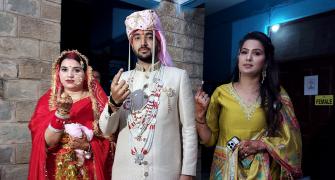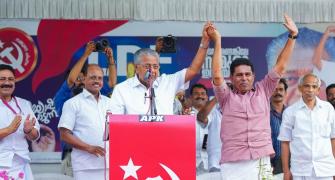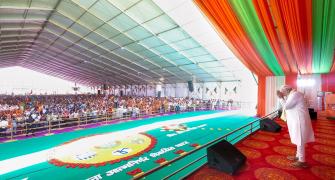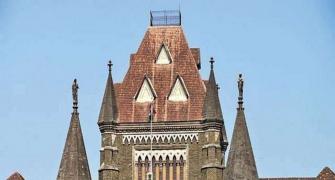After many years in the United States, she had come back to her beloved Chennai, where she learnt classical dancing and acted in a movie for the first time in 1949. She was partying late into the night with other film stars just before she passed away. She would not have liked to lose her glamour even in death. At 74, she was passionately in love with life and enjoyed it.
Padmini had just begun her second career as a dance teacher in New York when my wife Lekha and I met her for the first time. She had left her flourishing acting career to settle in New York after marrying Dr Ramachandran, but dancing and acting were in her marrow and she could never have given them up. She started Bharata Natyam lessons for Indian American children in the basement of her New Jersey home, which grew into one of the biggest Indian dancing schools in the United States and inspired many others.
Padmini had begun to perform once again on the stage in the United States. I recall the first time I saw her perform the 'nava rasas' on the stage. She captivated the entire audience as she went through the nine cardinal emotions, which she had repeatedly performed in several movies opposite every leading male star in the country -- Raj Kapoor, Rajendra Kumar, Sivaji Ganesan, M Ramachandran, Gemini Ganesan, Satyan, Prem Nazir and a host of others. She found fulfillment as she portrayed mythological characters on the stage after she gave flesh, blood and voice to many memorable characters on the screen.
It was when Lekha joined Padmini's team to produce a Ramayana ballet that I spent several weekends with Dr Ramachandran in his study as the ladies rehearsed downstairs. Once I got to know him, it was no more a chore for me to drive to New Jersey to take Lekha to her rehearsals. Dr Ramachandran was a dog lover and the owner of many pedigree dogs, which won prizes at many shows. I admired the many medals and ribbons won by his dogs without revealing my paranoid dislike of dogs.
A day after one of those days of dog stories and dancing in 1981, we were shocked to hear that Dr Ramachandran died of a heart attack. Apparently, he felt uncomfortable on his way to work and drove straight to the emergency, but he could not be saved. Padmini was shattered as the family life for which she had abandoned her career lay shattered. But her son Prem, the dancing school and her many friends and admirers kept her back in the United States even after her husband passed away. She faced the future with great courage and determination.
Her return to the movies was logical after her son grew up and there were others to run her dancing schools. She acted in some Indian-American ventures initially and staged a dramatic come back in a Malayalam movie as a fond grandmother. Padmini was back as a leading star and she was in great demand.
Padmini divided her time between New Jersey and Tamil Nadu till she returned a few months ago to live once again in her homeland. When she left the US, she left behind not only many dance teachers, whom she trained, but also a set of traditions, which have come to stay in the life of Indian Americans. One of them is the tradition of arangetram or graduation that every young dancer should go through. Indian-American parents have begun to treat these occasions as important events in the growth and development of their children. Padmini has done more than anyone else in propagating Indian dances in the United States.
When I saw her last year at the gala dinner organized by Rediff India Abroad to felicitate the India Abroad Person of the Year in New York, I did not realise that I would not see her again. She was full of life and energy and was in animated conversation with all of us around the table. She even spontaneously walked up to the podium to congratulate a famed dress designer who was being honoured at the dinner. She enthralled the audience with her stories with a touch of humour.
Padmini's return to Chennai this year was an emotional comeback for her. It was in this city that she and her sisters gained recognition as leading dancers many years ago. Gopika Varma, a celebrated Mohiniattam dancer and researcher, recalls how Guru Vazhavoor Ramaiah Pillai told her that it was an uphill task for Padmini and her sisters to make a mark at a time when Brahmins like Vijayanthimala and Kumari Kamala dominated the scene.
Padmini was very touched when the then chief minister J Jayalalithaa honoured her last year for her lifetime achievement. Her first words at a function, a quote from her popular movie, Thillana Mohanambal evoked an immediate and enthusiastic response from the audience. Within a short time, she had become a part of the cultural scene in Chennai and had begun to enjoy it.
I grew up hearing a popular Malayalam saying: 'There is no medicinal concoction without dry ginger; nor is there any movie without Lalitha and Padmini.' Together with her sisters Lalitha and Ragini, Padmini dominated the Malayalam film scene in the nineteen fifties and the sixties. She was the first in a long list of South Indian stars, who made it big in Bollywood. Her sojourn in the United States widened her horizons and gave her the opportunity to share her art with the wide world.
The Travancore Sisters, as they were called, made the erstwhile Travancore state itself immortal.







